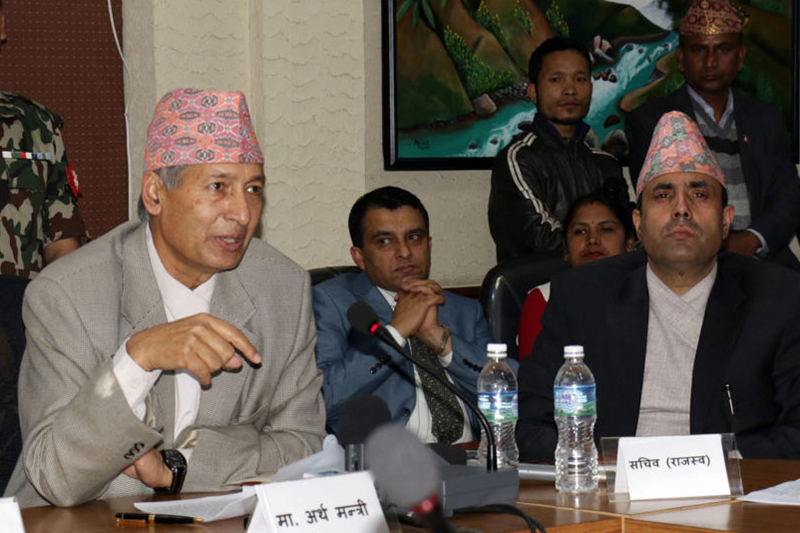White paper paints bleak economic scenario
KATHMANDU: The government today issued a white paper depicting a gloomy picture of the country’s economy.
Presenting the white paper at the Ministry of Finance, newly appointed Finance Minister Yubaraj Khatiwada stated that a majority of Nepal’s economic and development indicators at present were negative and economic activities were increasingly shrinking due to lack of a favourable business environment.
Khatiwada added that the government was facing a difficult time accumulating resources, especially following violation of budgetary or fiscal rules and regulations. “Tax waiver has been provided to businesses against the existing norms,” he said, adding that financial and resource assurances have been provided to projects without any project analysis. Khatiwada added that the government is facing difficulty even in estimating the budget size, as the current fiscal budget has not incorporated projects that were given resource assurance by the previous budgets.
Citing that earlier governments focused on a larger budget size without relevant revenue sources, Khatiwada said the tendency to prepare a budget in haste and without enough groundwork had raised questions regarding the credibility and reliability of the country’s budget. “The existing budget is more distributive than productive,” he added.
Likewise, Minister Khatiwada also stated that the tendency of the governments to take decisions without consulting the Ministry of Finance had not only added financial pressure on the government but also reflected the deteriorating fiscal discipline in the country.
Stating that administrative expenses of the government will skyrocket under the new federal system, Khatiwada said, “The government will face a deficit of at least Rs 200 billion to fund the projects and plans proposed in the budget.”
Against this backdrop, the finance minister said the government would be stricter in approach towards maintaining fiscal discipline and improving financial governance mechanism in the country in the days ahead.
Khatiwada added that the country’s widening trade deficit, slow pace of post-quake reconstruction, rise in unofficial economy, instability in bank’s interest rate and rising unhealthy competition among banks and financial institutions, low access of people to banking and financial services and delay in project development remained major setbacks to the economy.
However, on a positive note, the white paper states that the country has opportunities for development owing to the successful completion of elections and formation of a stable government.
Meanwhile, the country’s private sector has welcomed the white paper, stating that the government has at least acknowledged the bleak condition of Nepal’s economy. “The white paper depicts government’s realisation that the country’s economy is awful and business environment is still bad. The private sector is optimistic that this realisation of the state of Nepal’s economy by the government will guide its future policies and decisions,” said Hari Bhakta Sharma, president of Confederation of Nepalese Industries.
Sharma added that government’s future moves should intend to promote self-sustained economy by encouraging domestic production and substituting imports.
What is white paper?
White paper is basically a government report on a particular subject that highlights detailed information on the topic. In economics, white paper is a concise report that reflects the situation of economy. Though the government does not have exact record of how many times the white paper has been issued in Nepal, four finance ministers have issued white papers in the last one decade — Baburam Bhattarai in 2008, Bharat Mohan Adhikari in 2011, Bishnu Paudel in 2015 and Finance Minister Yubaraj Khatiwada.
Economists have lauded the government for the white paper issued on Friday, stating that it was timely and necessary to further drive the country’s economy. “Generally, a government needs to issue a white paper when the country’s economy is on a negative track or during disasters. Friday’s white paper not only reflects the country’s current economy but also provides guidance to the government’s future action,” Madan Dahal, a senior economist, told THT.
(UPDATED)
Finance Minister Khatiwada presents current picture of nation's economy
KATHMANDU: Finance Minister Yubaraj Khatiwada today pointed out economic challenges facing the country due to various causes. Blaming the lack of proper capital mobilisation in part for economic challenges, he stated some difficulties in budget expenditure.
"Big projects fail to be completed in stipulated time, and for estimated costs. Distribution-oriented programmes have surpassed productive ones," he said.
He also stressed the need for all to help achieve the goal set by the government to upgrade the country to the list of developing one by 2022.
He pointed out failure in making industry sector competitive, while identifying additional challenges alongside shrinkage in investment in employment and production sectors.
"Industries established by the government are in loss. Problem of unemployment is growing in Nepal's labour market. Fiscal mobilization is yet to reach rural areas," the Finance Minister added.
Stating that domestic capital market was just limited to securities, he said the entire nation's economy had become import-oriented. Allocation of budget without proper plan and the trend of spending capital budget at the eleventh hour of the fiscal remained as challenges in the economic sector. "Huge budget has been invested to operate a pension fund."
As stated by the Finance Minister, the government has not got price (results) for its investment in public enterprises and it is yet to pay them for the management of employees' salary and for operation of the retirement fund. He was of the view of proper development and utilization of information technology to attain economic progress.






